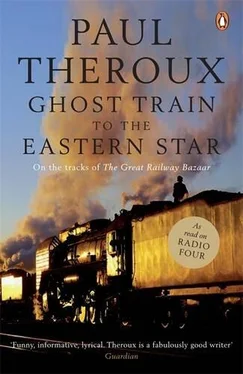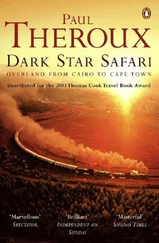To the southeast is Haydarpasa Station, looking like a dark waterside cathedral. Thirty-three years before, I had boarded an express to Ankara and Lake Van. Changing trains, taking buses, I had traveled overland to Iran and India and beyond. Things were different now: the Iranians had turned down my visa application, and war had brought anarchy to Afghanistan. I would take another route this time, head through Turkey and then hope to detour around Iran by changing trains in Georgia and rolling onward, through the Stans: Azerbaijan, Turkmenistan, Uzbekistan — places that had been forbidden to me all those years ago — and into India.
After three night trains I needed a breather in Istanbul. A short walk from Sirkeci Station was the ferry terminal. I took the ferry to the landing stage at Besiktas and strolled to the Ciragan Palas. This hotel was part of an old and elegant Ottoman palace, and was as welcome a hotel as the Pera Palas had been in the past. It was expensive, but it was at the edge of the Bosporus and easy to get to, a 20-cent ride on the ferry.
Since the mid-nineteenth century, the Istanbul ferries "were such a part of everyday life that they assumed an almost totemic importance." The ferries dip and roll; the best way of admiring the vast, separated city is from the rail of a boat. "The ferries' great gift to the skyline is the smoke from their chimneys."
The words are those of Orhan Pamuk, the distinguished novelist and Istanbullu — he seldom left the city of his birth and said he had never been tempted to live elsewhere. Thirty-three years before, I had happened to meet Yashar Kemal, the novelist and political tub-thumper. He was still alive at the age of eighty-two, but was out of town. I decided to go in search of Pamuk and to see what the decades had done to Istanbul. For Pamuk, it is a city of joy and also of "overwhelming melancholy," and yet the Bosporus is "the font of our good health, the cure of our ills, the infinite source of our goodness and goodwill that sustains the city and all those who dwell in it."
In his unusual chronicle of his life in the city, Istanbul: Memories and the City, Pamuk describes his childhood, his fractious family, his chronic ennui, his self-imposed solitude, his daydreams, his love of the side streets and the ships and the preoccupations that are peculiar to Istanbul. This is one of my favorite city books because it is written by a native son, a keen observer who knows all his city's faults as well as its virtues. It is right that it is also a family memoir, because his relationship with Istanbul is familial, the city like an uneasy relative, a funny uncle or an eccentric granny who provides him shelter. Such a book might be written by a New Yorker or a Parisian, but it would not be so persuasive, because New York is a modern city with a thin substratum and Paris is an artifact if not a confection. And a Turk is someone with deep roots, not a mere urbanite or transplant. For a Turk, Istanbul is an extension of Turkish culture and the Turkish personality, reflecting its conflicts, obsessions, and character traits. Its complex and glorious history is evident in many of its buildings, glimpses of Byzantium and Constantinople above the heavy traffic and the teenyboppers on cell phones.
Istanbul is ancient, and Istanbullus carry its old-fangledness in their heads — Pamuk is the proof of that. What do you think of us? the Turks often ask of strangers. New Yorkers and Parisians never ask such things, nor do Londoners, who take the view that strangers are the ones to be assessed or mocked, certainly not themselves. In most cities, the inhabitants are too busy and hard-pressed to care. But Turks are different, self-conscious of their longitude on the map, straddling Europe and Asia.
"To some degree, we all worry about what foreigners and strangers think of us," Pamuk says. "My interest in how my city looks to western eyes is — as for most Istanbullus —very troubled; like all other Istanbul writers with one eye on the West, I sometimes suffer in confusion."
"To see Istanbul through the eyes of a foreigner always gives me pleasure," Pamuk goes on. Flaubert, Gide, Nerval, Knut Hamsun, and Hans Christian Andersen all visited Istanbul and recorded their impressions, and in most instances what they saw was a fading Orientalism that ceased to exist as soon as it was described — the harem, the grotesque and the picturesque, dervishes, hubble-bubble pipes, the slave market, Ottoman clothing, floppy sleeves, Arabic calligraphy, and, he says, the hamals, the porters, though such men can still be seen, heavily burdened with huge loads on wooden pack frames, trudging up and down the cobbled streets of the old city. Whenever I began to generalize about Istanbul's modernism, I encountered an exotic vignette — a shroud, a fez, a minaret, a veil, a donkey, or someone grilling fish over coals by the roadside.
But Pamuk's book, like all passionate books, is a bewitchment. Once you've read his Istanbul, you have been persuaded to see the city with his eyes — a gloomy, smoky warren of narrow lanes and conflicted families, serene, half fictional, like a city in a dream.
I find most cities nasty, but I can see that Istanbul is habitable, a city with the soul of a village. Unless there is a bomb in the bazaar, or a Kurd-related outrage, there is never news of Istanbul in the Western press. To say it is beautiful is so obvious as to be frivolous, yet the sight of its mosques and churches can be almost heart-stopping. I am impervious to its charm, even the word "charm," but I admire Istanbul for its look of everlastingness, as though it has always existed (it has been a noble city since its first incarnation as Byzantium 1,700 years ago, and looks it in part). Most of all I like the city for its completeness and its self-sufficiency: it is a finished work, distinctly itself. Of course, you can buy gold and carpets in the Grand Bazaar, or jewelry and leather goods in the Egyptian bazaar, but everything else is available throughout the city too, because Turkey makes everything — stationery, cheap clothes, computers, knives, cigarettes, refrigerators, furniture. Heavy industry flourishes. The newspaper business is lively and competitive, book publishing is energetic, Turkish literacy is high, and book sales are brisk.
Given the fact that Turkey shares borders with Iraq, Iran, Syria, Arme nia, and Georgia, as well as Greece and Bulgaria, it could be a cockpit, yet it is a generally calm and self-assured place.
Istanbul now was vastly more prosperous in the look of its spruced-up buildings and well-dressed inhabitants. The ferry to Besiktas was proof of that, with its Sunday-serene passengers: little families holding hands, groups of muttering boys, smiling girls with their eyes downcast for modesty's sake, elderly women in shawls, bearded mullahs, shrouded wives in black burqas, every gradation in the chairs and pews of the ferry, from defiant unbeliever to scrupulous Koran reader.
The city is dramatic in its vistas, its spaces, its mixed population, and for appearing to accommodate everyone, but it is too big and sprawling to be definable. Yet because it is whole and coherent, self-sufficient, with an impressive profile of domes and spires, it is an easy city to visit, allowing the traveler to be presumptuous. The formalities of Turkish life, the elaborate courtesies of the Turkish language, encourage politeness.
The massacre of Armenians a century ago, the later expulsion of Greeks, and the Kurdish outrages and Turkish reprisals are lamentable facts of Turkish history; still, no city in Asia is so self-consciously reform-minded. And it is lucky in its writers, who are public intellectuals in the European mode — Orhan Pamuk was one of many who denounced the downplaying of the Armenian slaughter. He represented a public conscience. Yashar Kemal had played that role, as had his near namesake Yaya Kemal. All such people — public speakers, makers of statements, sometime journalists, polemicists with their passion and daring — were almost unknown in the countries I'd just passed through: Hungary, Romania, Bulgaria. A young woman novelist, Elif Shafak, was also outspoken against excessive Turkification and in defense of Sufism. Many of the writers were in hot water when I arrived, but they seemed (as Turkish writers frequently do) to regard hot water as their natural element.
Читать дальше












